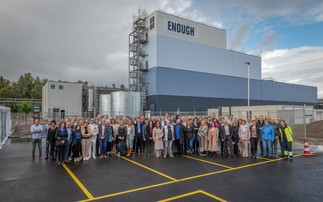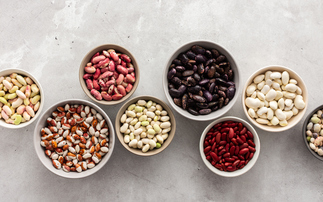In our latest SDG case study, BusinessGreen talks to Tesco about a four-year partnership the aims to halve environmental impact of a weekly shop - but 'without telling people what to eat'
Getting kids to eat their greens has always been a tall order. So much so, in fact, that some parents have been known to pretend forkfuls of nutritious food are actually large aircraft circling towards their children's terrified mouths - a move that can surely only be explained by desperation.
Yet the struggle for healthy diets extends to adults, too. Despite a decades-long campaign, in 2017 apparently only one in four adults were fulfilling the five-a-day fruit and veg target, according to the NHS.
Now, though, the situation is becoming mission critical. Not only are healthy, well-balanced diets consisting of high amounts of fruit, vegetables and other healthy foods good for personal health, evidence continues to mount of the importance of plant-heavy diets for environmental health too. An entire UN Sustainable Development Goal (SDG) - SDG2 - is dedicated to not just tackling hunger, but doing so in a way that ensures food supplies are healthy and environmentally sustainable
And meeting the goal could hardly be more critical. In new research earlier this month, the struggle to feed a growing global population over the coming years while cutting greenhouse gas emissions to avert catastrophic climate change was labelled "the mother of all sustainability challenges". 60 per cent more food will be required by 2050, it estimated, yet this will all need producing using only a fraction more land than is already dedicated to agriculture. Meanwhile, soils are eroding, water is becoming scarce, and drought and storms are only set to increase in frequency and severity.
Healthier, more sustainable diets supplied using greener farming techniques are not just a win-win for human health and the planet, but an absolute necessity for the survival of the global food system.
It amounts to a perfect storm of sustainability challenges for large food-focused companies. But how can they best respond to such complex and inter-locking challenges?
That is a question Tesco is hoping to try and address through its new long-term partnership with WWF, in a project they claim is one of the first of its kind anywhere in the world.
Over the course of the four-year initiative, which was announced last month, the supermarket giant has set the ambitious goal of cutting the environmental impact of the average UK shopping basket by 50 per cent.
"There are essentially three ways in which it's possible to reduce the environmental impact of food, which is unequivocally what the whole industry will need to do over the next 10, 20, 30 years," explains Giles Bolton, Tesco's responsible sourcing director.
Looking right across the food system, the aim of the partnership is to explore ways to encourage shoppers to adopt more sustainable diets, boost biodiversity in food production, and slash food and packaging waste, all of which "will have to shift really quite significantly", he tells BusinessGreen.
"Then the really interesting question for us is, when we've looked at that, what can we do by ourselves in partnership with our suppliers?" Bolton adds. "We want to do this because it is the right thing for our customers, but we need to make sure it is scalable and affordable, and to convene with the wider industry to make change. WWF has a role to play in being able to engage with customers, as they are looked to as an independent body, rather than as a supermarket like us."
With the partnership having only just been launched, the rollout of specific policies and measures is still some way off. But top of the to-do list for the first year is the creation of a "pioneering industry measure" of the environmental impacts of the average shopping basket, from which they then hope to develop a series of more specific actions.
"In the food industry at the moment we don't really have a set of measures that come together and give us a picture of the overall environmental impact," explains Bolton. "But once we can set those measures, then we'll be able to look at what the right balance of priorities are, and how quickly we can create a shift. That's a really foundational piece of work. Obviously we hope it will be of interest to other retailers and food producers as well, but we're doing it because we need to do it for the partnership."
Ultimately, however, Tesco will need its peers and partners to shift towards more sustainable diets, farming, and packaging approaches. "You can't do it by yourself," Bolton concedes. As such Tesco and WWF therefore plan to share the data, findings, and recommendations from the initiative with the wider industry in a bid to catalyse wider action.
"We don't have a hope of creating a healthy, sustainable, affordable offer for our customers - which is what people want - unless we are part of that shift for the industry," Bolton explains. "Very broadly, you can't make stuff affordable unless it's sustainable, because we won't be able to produce it in future. But we can't make stuff sustainable unless it is also affordable - this has to be a mass market shift."
Tackling packaging waste, food waste and unsustainable farming across production and supply chains are major challenges for the food industry, as well as critical components for ensuring SDG2 is delivered at the global level. However, there are some encouraging signs the sector is already embarking on work in these areas - such as through the Plastics Pact and the Courtauld Commitment - while there is also widespread support for government proposals for a post-Brexit agricultural policy focused far more on rewarding farmers for protecting the environment. But all of these major industry shifts will be difficult without a sea change in consumer diets and habits, too.
Indeed, while Tesco itself is more than aware that the current global food and farming system is unsustainable, it is open about the fact its decision to team up with WWF was largely driven by consumer demand. A survey of 2,000 shoppers carried out on behalf of the retailer found 80 per cent wanted supermarkets to do more to cut the impact of food shopping on the planet.
Further positive news, too, comes from the fact that unlike kids at the dinner table, British adults have already been demonstrating a desire to shift their diets towards more plant-based, sustainable foods over the past couple of years, with recent research suggesting a third of Britons have stopped or reduced eating meat, for example.
Yet even so, there is still a long, long way to go before a genuinely sustainable shopping basket is affordable, accessible, and desirable for most consumers. And encouraging that shift among customers presents difficult balancing act for supermarkets, explains Bolton. "We know they don't want us to decide what they eat, but they want us to make it easy for them," he says. "I don't think most customers really look to supermarkets for advice on diets, but I think there is role we and WWF can play in facilitating that."
For example, another plan WWF and Tesco have for the first 12 months of the partnership is to put together a 'Love Your Food, Love You Planet Plate', which would demonstrate what a balanced, healthy and sustainable diet might look like for customers, with potential different variations for different communities. But, Bolton emphasises: "We're not here to tell people what to eat, and it wouldn't work if we did."
As supermarkets encourage customers to consider more sustainable, plant-based diets, you could forgive some of the food industry's incumbent suppliers - such as beef and dairy farmers in particular - for feeling apprehensive about the impact of this shift on their business. But Bolton argues consumer diets and habits in the food sector are always shifting - the raft of exotic food choices on supermarket shelves nowadays are a far cry from 20 or 30 years ago, for example - and that change should be welcomed as it opens up a wealth of opportunities.
"I think it would be wrong to paint this as a game of winners of losers, because I don't think it's going to turn out like that," he argues. "If you look at the innovation at the moment, you just get really excited by it. There has always been shifts in the food industry, and this is another shift that is coming, but it will be gradual and Tesco will work really hard with our partners on this."
Healthier diets, affordable food, sustainable agriculture, and economic opportunities - it is all there for the taking if stakeholders across the wider food industry all embark on the journey in pursuit of a sustainable food system together, argues Bolton.
"What we shouldn't forget is there is loads and loads of opportunity in how this moves," he concludes.










